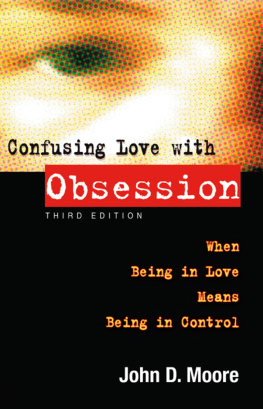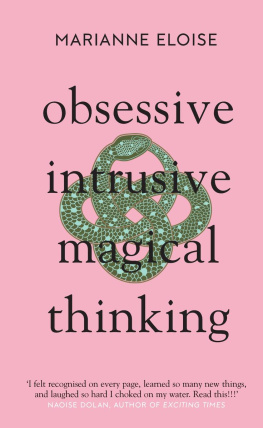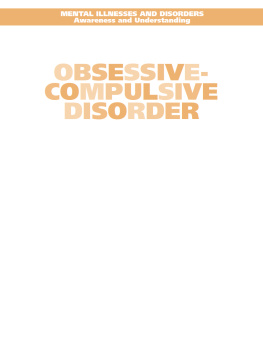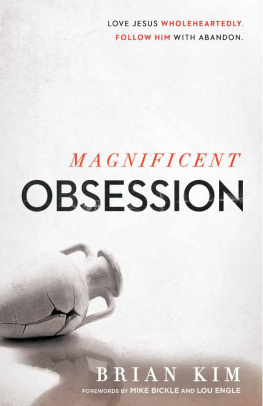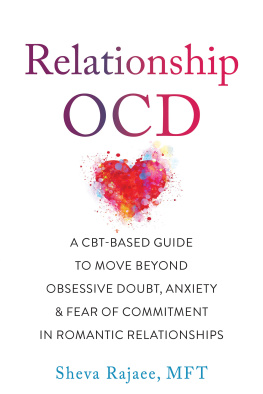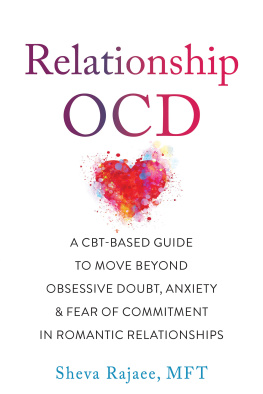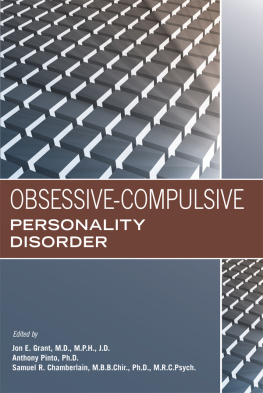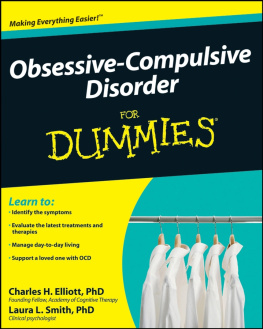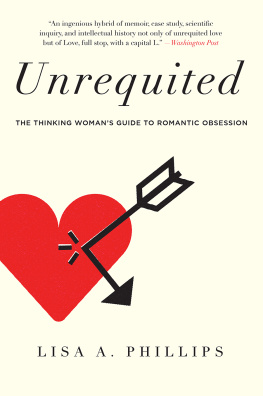CONFUSING
LOVE
WITH OBSESSION
CONFUSING

WITH OBSESSION
When Being in Love
Means Being in Control
Third Edition
JOHN D. MOORE
Hazelden Publishing
Center City, Minnesota 55012-0176
800-328-9000
hazelden.org/bookstore
2002, 2004, 2006 by John D. Moore
All rights reserved
Originally published by iUniverse, Inc., as Confusing Love with Obsession: When You Cant Stop Controlling Your Partner and the Relationship
Third edition published by Hazelden in 2006
Printed in the United States of America
No portion of this publication may be reproduced in any manner without the written permission of the publisher
Library of Congress Cataloging-in-Publication Data
Moore, John D., 1970
Confusing love with obsession : when being in love means being in control / John D. Moore. 3rd ed.
p. cm.
Includes bibliographical references.
ISBN-13: 978-1-59285-356-4
ISBN-10: 1-59285-356-0
Ebook ISBN: 978-1-59285-964-1
1. Relationship addiction. 2. Obsessive-compulsive disorder. 3. Control (Psychology) 4. AddictsRehabilitation. I. Title.
RC552.R44M66 2006
616.8584dc22
2006043571
Authors note
All of the discussions, case histories, and stories contained in this book are based on actual experiences. To protect the privacy and identity of the people involved, names and details have been changed. In some cases, composites have been created.
This book is intended to help people who may be suffering from an addiction to relationships and are seeking information as it relates to recovery. The information contained herein should be used for informational purposes only. Readers are encouraged to research the issue of relationship addictions and discuss any possible concerns with their health care providers.
10 09 08 07 06 6 5 4 3 2 1
Cover design by David Spohn
Interior design by Ann Sudmeier
Typesetting by Prism Publishing Center
For my mother:
You passed away a few short months before
the publication of Confusing Love with Obsession.
I will always love you.
To my brother Frank:
I am a part of you, and you are a part of me.
To the overworked and underpaid human service worker:
The work you do is important.
To those who suffer silently:
You are not alone.
CONTENTS
ACKNOWLEDGMENTS
WORDS CANNOT EXPRESS my sincere, heartfelt gratitude for the people who helped me make this book a reality. I first wish to thank Quinn Tyler Jackson who patiently read through everything I ever sent him and offered his feedback in a caring and supportive manner. On the days I thought I would never get through this project, he was a source of comfort and compassion.
I would also like to thank Robert Donato for being a loving friend. Whenever I wanted to bounce a particular point of concept off Bob, he was there to listeneven as late as three oclock in the morning. He truly helped me shape the direction of this book and is a walking saint.
Another helping friend was Joe Phillips, who read each chapter of my manuscript and made the necessary corrections to my grammar. Eager to help and always supportive, Joe helped me to see things I could not. He is a truly wonderful person and gifted human being.
Finally, I wish to thank all of the people who shared their personal trials and tribulations. You have helped to shed light on a problem that does not get better over time.
SHELTER FROM THE STORM
An Introduction
Any building that has stood firm, surviving the great disaster undamaged still has its roof drowned by the highest waves, and its towers buried below the flood. And now the land and sea are not distinct, all is the seaa sea without a shore.
Ovid, The Metamorphoses
WE HAVE FEARED STORMS since the beginning. During early years, our species huddled in caves, pieced together flimsy shelters made of sticks and animal skins, and hid under cliffs for protection from the sky. When ominous storm clouds collided on the horizon, we prayed to ancient gods to shield us from natures fury.
As decades turned into centuries, we advanced technologically and learned to craft stronger, mightier shelters made of concrete and glass, daring the storms to take their best shot.
Today, our homes are weatherproof and, for the most part, save us from the skys wrath. At this very moment, satellites are in continuous orbit above our world, scanning the planet for signs of trouble and warning us of pending atmospheric doom. We rejoice each time we escape a storms rage and feel relieved when the threat of destruction has passed.
Indeed, on those occasions when we have triumphed over the storm, wewere in control.
But sometimes, despite the warnings signs, storm clouds collide and destroy our weatherproof homes, crushing them with fantastic, intense power. When this happens, we arrive at the stark realization that control was just an illusion. In our grief, we examine the damage to others and ourselves and ask the question, Why? Left helpless and alone in a sea of destruction and sorrow, we choke back painful tears and cry out to God, How could this happen? and What do I do now?
You see, it is not the storm itself we fear but the aftermath of what it leaves behind.
For some of us, being in a personal relationship is like trying to control a powerful, destructive storm. It is a cruel, never-ending battle that requires every ounce of energy to wage. Tragically, however, no matter how much we try to exert control over the storm, it always wins.
When being in a relationship means needing to be in control, we are confusing love with obsession. When we pathologically obsess over our partners whereabouts, we are confusing love with obsession. When we refuse to let her have any friends and are constantly monitoring her, we are confusing love with obsession. When we make her quit her job or do not let her work at all, fearing possible infidelity, we are confusing love with obsession. When we believe we can stop his abusive ways by changing our behavior, we are confusing love with obsession. When we cant sleep at night because our minds are on him, we are confusing love with obsession. When we keep him overweight or refuse to let him exercise, we are confusing love with obsession. When we use money as a tool to chain her to the relationship, we are confusing love with obsession. When we use drugs, alcohol, and sex as a way of coping with the pain in our relationships, we are confusing love with obsession. And when we feel that we cannot live without our partner, we are absolutely confusing love with obsession.
You may be reading this book because you are confusing love with obsession. Quite possibly, you are reading this book because you have learned that your significant other has been cheating, and you want to manipulate the situation to your advantage. Or maybe you are tired of obsessively worrying over your partners whereabouts and are emotionally and physically drained. Perhaps you are living with a partner who has become unbearable, controlling every part of your life. For all of these reasons,
Next page
